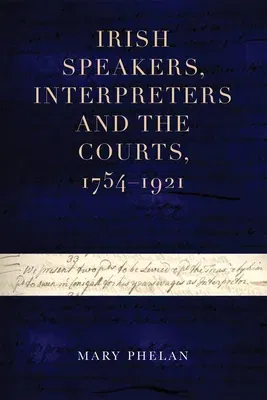Mary Phelan
(Author)Irish Speakers, Interpreters and the Courts, 1754-1921Hardcover, 27 September 2019

Qty
1
Turbo
Ships in 2 - 3 days
In Stock
Free Delivery
Cash on Delivery
15 Days
Free Returns
Secure Checkout

Part of Series
Irish Legal History Society
Print Length
256 pages
Language
English
Publisher
Four Courts Press
Date Published
27 Sep 2019
ISBN-10
1846828112
ISBN-13
9781846828119
Description
Product Details
Author:
Book Format:
Hardcover
Country of Origin:
US
Date Published:
27 September 2019
Dimensions:
23.62 x
16.26 x
3.05 cm
Genre:
Ireland
ISBN-10:
1846828112
ISBN-13:
9781846828119
Language:
English
Pages:
256
Publisher:
Series:
Weight:
639.56 gm